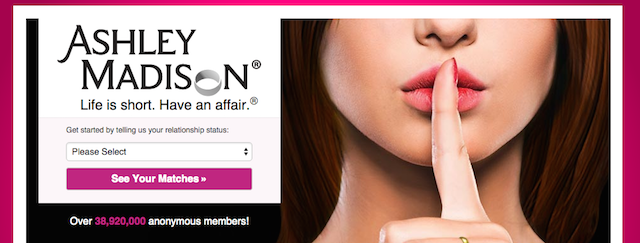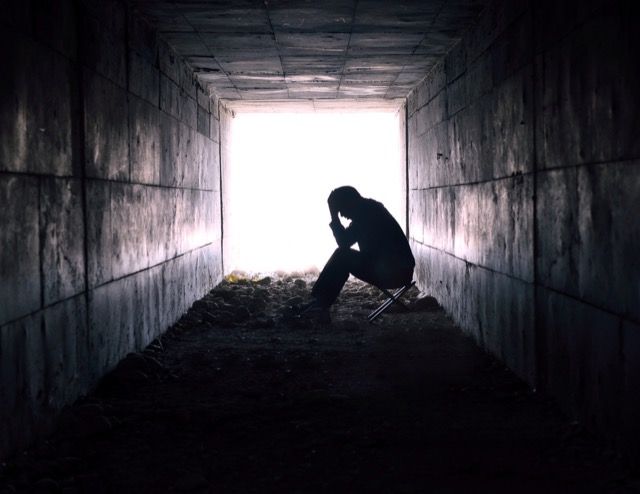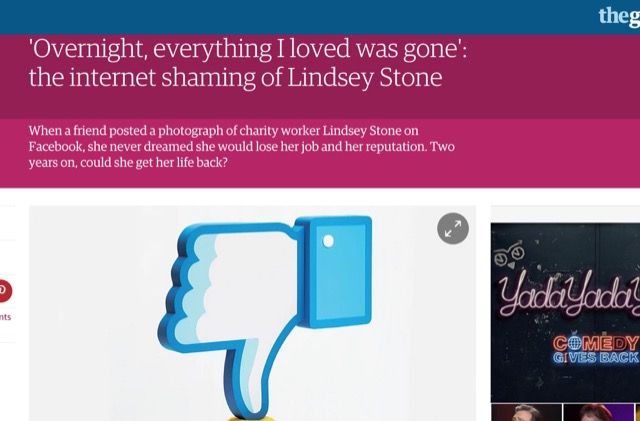The Internet at large is positively ecstatic about the Ashley Madison hack. Millions of adulterers' and potential adulterers' information released online for everyone to see. Countless tweets about divorce lawyers, flower shops, and politicians. Public articles outing individuals found in the data dump. Hilarious, right?
Not so fast.
There are bigger issues at play here than just celebrating the potential destruction of millions of people's lives.
1. We're establishing a culture of privacy violation.
You may be thinking that you didn't shame or bully anyone—you just laughed about it on social media. But that doesn't mean you're not complicit. Impact Team made a token effort to make this about Ashley Madison's less-than-stellar cancellation policy, and even called out "those men, they’re cheating dirtbags and deserve no such discretion," to make it seem like this was a morally driven action.
If you believe that Impact Team is trying to be the moral police of the Internet and did this because they thought it was a good thing, you're fooling yourself. Groups like Impact Team do these things because they can, and because they want attention. What kind of message are we sending by flooding the Internet with the sort of exuberant exultations that we've been seeing for the past week?
Positive reinforcement is a pretty basic principle in behavior modification — if you show someone that there's going to be a positive reaction to what they've done, they'll do it again. Which means we're inviting Impact Team, or someone like them, to repeat this debacle. To violate the privacy of a group of individuals so we can laugh at them from our perceived moral high ground.
They've already attacked Ashley Madison. Who's next? Who else could they target that the Internet would feel moral superiority over? Who might the Internet deride as a hypocrite? Pro-lifers who have visited an abortion clinic? Family bloggers who have had the police respond to domestic disturbance calls? Why wouldn't these people be targets of groups like Impact Team?
And where do we draw the line? When would the Internet finally respond negatively to a hack like this? Let's say a group releases adoption records and thousands of kids find out that they're adopted. That might get a negative response. But does that response help those children? No. Are we willing to throw them under the bus so that we can laugh at all of the people who've been outed for things that make use feel better about ourselves?
This is what I mean about a culture of privacy violation. It's becoming a form of entertainment—just think of the nude celebrity photos that were released after the iCloud attack earlier this year—and that's a very, very dangerous road to start down.
2. Online shaming has real, significant consequences.
In 2002, Amel Guedroudj, a student at a high-caliber Scottish school, hung herself in her bathroom after pictures of her partially clothed were circulated on the Internet. She was highly intoxicated (and possibly unconscious) when six boys took photos of her. She was sixteen. She made a mistake, it got out online, and she killed herself.
Online shaming has resulted in lost jobs, death threats, doxing, and the loss of professional reputation. Most of these have been over incidents that have been, in the grand scheme of things, pretty minor, like Lindsey Stone's famous tweet of her being disrespectful at Arlington Cemetery. After her social media destruction (including a "Fire Lindsey Stone" page on Facebook that got 19,000 likes), Stone didn't leave her house for a year and was afraid to date.
There haven't been many stories about the consequences of the Ashley Madison hack, though it's likely that we'll start seeing more of them soon. This will be hugely appealing to many of the people who have responded with joy to this event. However, security writer Graham Cluley has cautioned the gleefully celebrating masses that we could see serious harm come because of this leak.
And, as many people have pointed out, many people who have used the site may not have had an affair. Email addresses weren't verified, so someone could have used your email address to sign up. Some people considered having an affair, but never did. Some people engaged in emailing or chatting, but never met anyone. I'm not trying to excuse this behavior, but it could certainly change the context of someone's interactions with Ashley Madison.
There's almost always more to the story. These are multifaceted, complicated people that are unfairly reduced to the label "philanderer." And there are other people who are affected. Spouses, children, friends, relatives, co-workers . . . there's no telling how far these effects can go. Is that something you want to have been complicit in?
If you want to know more about the effects of online shaming, read Jon Ronson's new book, So You've Been Publicly Shamed. You'll be amazed at the cruelty of Internet denizens and just how serious the effects of these actions can be.
3. You're next.
What have you done that you're embarrassed about? Do you have a DUI somewhere in your past? Did you get fired for sleeping with your boss's wife or husband? Is there a police record that shows a picture of your spouse with a black eye?
A huge number of people have things they'd like to keep in the past. You got arrested at an extremist rally during college. You put someone in the hospital when you ran a stoplight. You donated money to a cause you no longer support and that's condemned by the popular media. How would you feel if your boss called you into their office and asked you about it? Or if your kids told you that their friends at school knew about it?
Just about everyone has something they want to hide, and there's almost certainly evidence of it somewhere online. And when it gets released, those people are going to be indignant when the rest of the Internet laughs at them for it. Do you think the Internet wouldn't laugh at some scarring event in your past? Take a look at this quote from Glenn Greenwald about how The Scarlet Letter lives on today and replace "sexual acts" with pretty much anything else:
"Busybodies sitting in judgment of and righteously condemning the private, sexual acts of other adults remains one of the most self-satisfying and entertaining – and thus most popular – public spectacles. It simultaneously uplifts the moral judges (I am superior to that which I condemn), distracts them from their own behaviors (I am focused on those other people’s sins, and thus not my own), and titillates (to condemn this, I simply must immerse myself in the tawdry details of their sexual acts). To see just how current is the mentality driving [T]he Scarlet Letter, observe the reaction to the Ashley Madison hack."
Think about that after the next big data breach. Do you want to be a part of the Internet culture that praises groups for violating the privacy of other people's lives? Do you want to be a part of the swath of society that's keeping the times of The Scarlet Letter alive?
Think Twice
We're big on advocating for online privacy here, and many of our readers are, as well. It's been disconcerting to see thousands of people celebrating a violation of privacy over the past week when we've worked so hard to convince them that privacy is something worth fighting for. And if it's worth fighting for, there can't be exceptions for the purposes of entertainment and moral self-aggrandizement.
So think twice about laughing at Ashley Madison. And prepare yourself for the consequences of thousands of other people's laughter.
Image credits: Ashley Madison, hikcrn via Shutterstock.com, The Guardian, dotshock via Shutterstock.com, Ioannis Pantzi via Shutterstock.com






